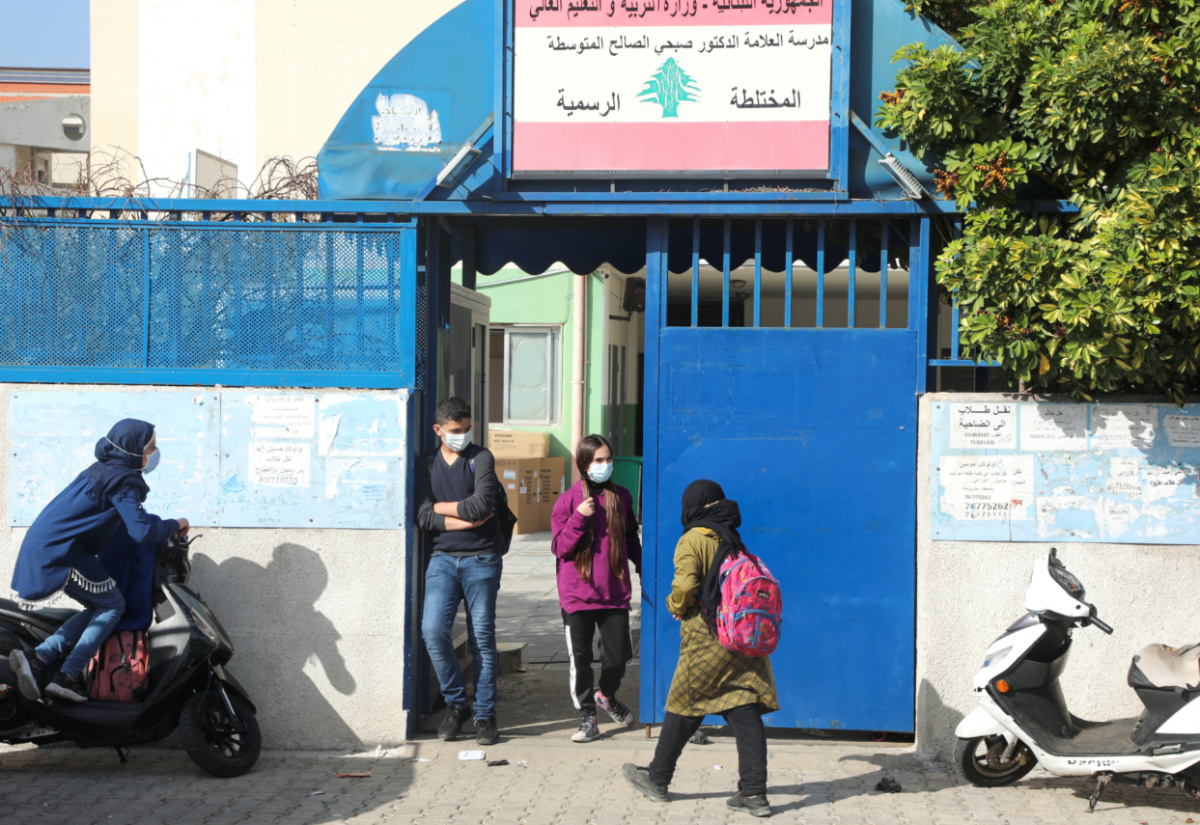Beirut, Lebanon
Reuters
Before Lebanon’s devastating financial crisis struck, Faraj Faraj thought university could set him on a path out of a cramped family home in a poor area of Beirut and towards financial independence.
Instead, like increasing numbers of Lebanon’s young people, soaring costs forced the 19-year-old to drop out of studying just over a year ago, before he had finished secondary school.
“I don’t have family who can help me complete my education, and there’s no work,” he said, adding that even though he was at a state school, the cost of transport had become hard to bear.

Students walk at the entrance of a public school in Beirut, Lebanon, on 23rd February. PICTURE: Reuters/Mohamed Azakir
UN research published in January showed that 30 per cent of those aged 15 to 24 in Lebanon had dropped out of education. More young people are skipping meals and cutting back on health care, the survey showed.
Faraj, his parents, two unemployed brothers and two younger sisters who are still in school sleep between two rooms in a small apartment in Beirut’s Borj Hammoud, a neighbourhood with narrow, crowded streets that was damaged by a massive explosion at the city’s port in 2020.
The coronavirus pandemic and the port blast, which still scars Beirut’s seafront, deepened what the World Bank has described as one of the worst economic collapses since the mid-19th century.
Though an elite earning salaries in dollars still throngs bars and cafes in upscale neighbourhoods, poverty has risen to 80 per cent and many struggle to afford meals and medicines.
“In the past we could buy things, even though there were difficulties,” said Faraj. “Now with the crisis affecting us more, it’s just food and drink.”
Brain drain
Faraj is training to become a hairdresser in a programme supported by UN children’s agency UNICEF, which aims to help young Lebanese facing soaring unemployment and wages of around $US2 per day for those who can find work.
“Once a young person drops out of school at the age of 13, 14, 15, it’s really difficult to get them back into school, and so they enter into a very precarious job market with a serious lack of education and skills,” said Alexandre Schein, head of UNICEF’s youth section in Lebanon.
“The implications are that the skills that are required to rebuild Lebanon and get it out of the crisis won’t exist in the country.”
UN and government data also shows a drop in spending on education and in school enrolment for children under 15, as well as a rise in child labour.
Some families have shifted from private to state schools, but those struggled to provide distance learning when the pandemic broke out and were hit by stoppages and strikes over teachers’ low wages after reopening.
Many school and university teaching staff have left their jobs or the country, joining an accelerating brain drain.

Lebanese Education Minister Abbas el-Halabi, gestures as he speaks during an interview with Reuters in Beirut, Lebanon, on 18th February. PICTURE: Reuters/Ahmad al-Kerdi.
The problems are tied to the country’s wider political and economic crisis, Education Minister Abbas el-Halabi said.
“Lebanese youth are gradually losing faith in continuing to live in Lebanon,” he told Reuters.
“It’s true that we’ve seen dropping out or abandonment or a distancing from schools. There are many families who no longer consider education important, but there is also great interest from some Lebanese, since this is the only weapon that they can give their children.”






